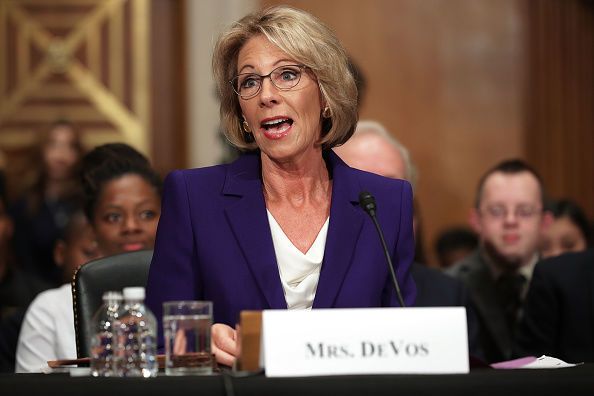Unless Biden acts fast, student debt is right around the corner

Betsy DeVos, then-President-Elect Donald Trump’s pick to be Secretary of Education, testifies during her confirmation hearing before the Senate Health, Education, Labor and Pensions Committee in the Dirksen Senate Office Building on Capitol Hill on Jan. 17, 2017, in Washington, D.C.
December 15, 2020
An Iowa State professor said the Biden administration will need to act fast or students will bear the brunt of student debt during the pandemic.
United States Secretary of Education Betsy DeVos decided to extend the suspension of federal student loan payments through January. According to the Department of Education, DeVos said this extension is necessary as the pandemic has made the financial situations for many students unfortunate.
“The coronavirus pandemic has presented challenges for many students and borrowers, and this temporary pause in payments will help those who have been impacted,” DeVos said. “The added time also allows Congress to do its job and determine what measures it believes are necessary and appropriate. The Congress, not the Executive Branch, is in charge of student loan policy.”
In addition, DeVos made interest rates 0 percent on federal student loans, something that has been in place since March.
While many student loans now have further aid as they compete with the pandemic, there are certain loans that do not fit under DeVos’ relief.
According to Forbes, Family Federal Education Loans (FFEL), Perkins loans and other private student loans are not eligible for relief. These loans account for $300 billion owed in outstanding student loans.
Many economists say higher education debt forgiveness is an inefficient way to help struggling Americans who face foreclosure, evictions and hunger.
With the additional relief and a new, Democratic administration coming into office this January, there has been a push for student loan forgiveness. Unfortunately, bearing a major shift within Congress, the landscape of student loans will likely remain unchanged.
Mack Shelley, professor and chair of the political science department, spoke on what to expect during a Biden administration.
“Unless the Biden administration can move quickly, it seems probable that students will be faced with bills in February absent an executive order to the contrary,” Shelley said. “With some luck, a cross-party, short-term legislative fix may happen, but at this point, there seems little advantage for either major party in a major compromise.”
Peter Orazem, university professor of economics, also echoed Shelley’s message and gave a preview on what to expect once loan payments are due.
“I do not think you can change your expectations of what is going to happen under a different administration based on [DeVos’ extension,]” Orazem said. “I think it is more likely under the Democrat administration, there may be some action on loan forgiveness than there would be under a Trump administration, but I do not think this signals anything in terms of what will happen in the future.”
















